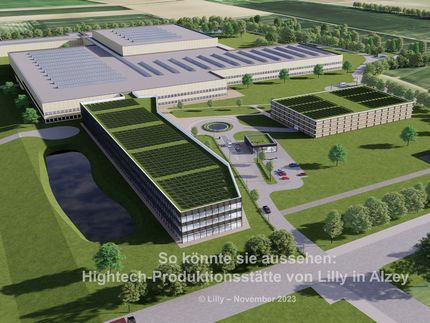German biotech sector: innovation and start-up activity on the rise, turnover and employment on the decline
Increased early-stage investments and full pipelines give hope
Advertisement
German biotech companies scored highly with investors in 2024: The sector raised a total of 1.9 billion euros in capital - an increase of 78% compared to the previous year, when this figure was 1.1 billion euros. If you exclude investments in companies that developed vaccines during the pandemic, this figure even represents an industry record. However, dark clouds are gathering on the horizon: In the first quarter of 2025, this upward trend came to an abrupt end; a total of only 130 million euros in financing was raised, a 78% drop compared to the first quarter of 2024, when biotech companies were able to raise 591 million euros.
Investments in the form of venture capital also rose sharply in 2024 compared to the previous year, from EUR 533 million in 2023 to EUR 898 million (up 68%) last year. In an international comparison, however, the amount of venture capital invested appears rather low: in Germany, 0.02% (0.01% in 2023) of GDP was invested in biotechs in 2024, at just under EUR 900 million. In the United Kingdom, the figure was 0.05 percent at 1.6 billion euros.
These are the findings of the "German Biotechnology Report 2025" by the auditing and consulting firm EY, which was compiled in cooperation with the industry association BIO Deutschland.
Klaus Ort, Partner at EY and Head of the Life Sciences & Healthcare market segment: "After an extremely good year in 2024, German biotech companies are currently finding it difficult to raise fresh money. Investors are cautious in view of the currently unpredictable developments in global economic flows, and the general uncertainty threatens to lead to a massive slump in biotech financing."
Oliver Schacht, President of BIO Deutschland e.V.: "It is still too early to say whether the 2024 financing was a one-off event or whether the German biotech sector will be able to successfully overcome the challenges of competing for equity capital with the strong players from the USA, Asia and Europe."
Industry turnover on the decline
Overall, total turnover in the biotech sector amounted to eleven billion euros in 2024 - a drop of eight percent compared to the previous year. The number of employees fell by five percent to 56,093 employees in 1,020 companies (plus two percent). For the first time since 2021, there was also an IPO of a German biotech company (Pentixapharm). There were four IPOs in Europe as a whole in 2024. In comparison: in the USA, 26 biotech companies ventured onto the trading floor in the same period.
Two large transactions contributed to a significant increase in the total M&A value received to 3.8 billion euros. Despite this high value, M&A activity in the sector remains relatively low overall, with only ten transactions completed in 2024 (22 in 2023). Klaus Ort: "This decline in transaction figures underlines the challenges companies face when it comes to achieving M&A exits in Germany. Although high-quality deals are possible, the path to successful acquisitions is complex."
Downward trend halted: early-stage financing is recovering
In 2024, the situation for early-stage financing has improved significantly compared to previous years: at a total of €420 million, early-stage financing has more than doubled compared to the previous year. In 2023, capital amounting to EUR 207 million was raised by early-stage biotech start-ups, which was the lowest figure in the past seven years. Back to last year: 25 transactions with an average transaction volume of 16 million euros were concluded in 2024. Particularly pleasing: the value of seed investments tripled last year to 104 million euros, with 13 portfolio companies benefiting from this inflow of capital.
Oliver Schacht: "The resurgence of seed financing points to a robust pipeline of innovative ideas from German biotech companies. But whether it is really already an indicator of a growing willingness of investors to support emerging companies that are ready to address critical medical and environmental needs remains to be seen. The new government definitely needs to act now and improve the availability of venture capital in this country."
Klaus Ort adds: "The increase in early-stage VC financing is a positive sign for the future of the industry. In addition to the pure inflow of capital, young companies in particular can benefit enormously from the network and expertise of investors. However, it goes without saying that expectations of the results of young companies are also increasing and with them the pressure to achieve presentable results in the short term."
Full pipelines give hope
High regulatory requirements, growing international competition and a shortage of skilled workers: despite the numerous challenges, the pipelines of German biotechs are currently well filled, even better than in previous years. Although there was a slight decline in phase 1 (55 clinical trials, five fewer than in 2023), the number of clinical trials in phase 2 (98 clinical trials, six more than in 2023) and phase 3 (21 trials, four more than in 2023) increased. Oliver Schacht: "The clinical pipeline shows a more mature profile, as more and more active ingredients are being evaluated in phase 2 and phase 3 clinical trials. German biotech companies are showing a strong commitment here - even by international standards - to tackling health and nutrition issues and thus making a decisive contribution to the search for solutions to challenges that affect us all." Oncology remains the main focus with 102 ongoing clinical trials showing the greatest variety of drug modalities.
This is another reason why EY partner Klaus Ort is primarily positive about the future of the sector: "The outlook for clinical progress in the German biotech sector is fundamentally positive, as the focus is increasingly on personalized medicine and innovative therapeutic modalities aimed at meeting medical needs. Nevertheless, the sector undoubtedly faces numerous economic, technological and geopolitical challenges. Digitalization and artificial intelligence (AI), as well as increased collaboration with partners, offer valuable opportunities to better address these challenges."
Note: This article has been translated using a computer system without human intervention. LUMITOS offers these automatic translations to present a wider range of current news. Since this article has been translated with automatic translation, it is possible that it contains errors in vocabulary, syntax or grammar. The original article in German can be found here.
Other news from the department business & finance
Most read news
More news from our other portals
Something is happening in the life science industry ...
This is what true pioneering spirit looks like: Plenty of innovative start-ups are bringing fresh ideas, lifeblood and entrepreneurial spirit to change tomorrow's world for the better. Immerse yourself in the world of these young companies and take the opportunity to get in touch with the founders.





















































